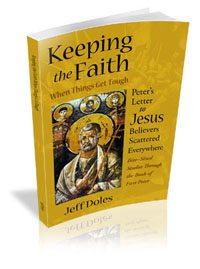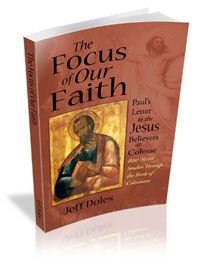And He said, “The kingdom of God is as if a man should scatter seed on the ground, and should sleep by night and rise by day, and the seed should sprout and grow, he himself does not know how. For the earth yields crops by itself; first the blade, then the head, after that the full grain in the head. But when the grain ripens, immediately he puts in the sickle, because the harvest has come.” (Mark 4:26-30)
Jesus likened the kingdom of God to a man sowing seed. His role is simple.
He scatters the seed. The Greek text uses the definite article — “the seed.” This man has seed to sow, and he does with it exactly what you are supposed to do with it; he sows it.
He sleeps by night and rises by day. He goes about his business. He does not worry about the seed. He does not keep pulling it up to see how it’s doing. He knows that he has done his part, and he trusts the seed to do its part. He does not know how the seed will do what it does; he just knows that it will. And so he rests and goes about his business.
When the grain ripens, immediately he puts in the sickle. He watches for the grain to ripen, then he harvests the fruit of the seed he has sown. It is an age-old principle: “While the earth remains, seedtime and harvest … shall not cease” (Genesis 8:22).
Do not be deceived, God is not mocked; for whatever a man sows, that he will also reap. For he who sows to his flesh will of the flesh reap corruption, but he who sows to the Spirit will of the Spirit reap everlasting life. And let us not grow weary while doing good, for in due season we shall reap if we faint not. (Galatians 6:7-9)This man does not sow in fear, but in expectation. From the beginning, he has a vision of the harvest. He has an expectation of reaping, and he is patient. He does not reach for the sickle when the seed begins to sprout and the blade comes up. He waits. It begins to bud and blossom. Still he waits. The fruit grows and comes to its proper fullness. But it is not yet ripe, so he keeps waiting and watching. When the fruit is fully ripe — now it is time, and he reaches for his harvesting tools.
Notice that puts in the sickle immediately. All the while he has been waiting, he has been watching, for he knows that the time of harvest, when it comes, comes suddenly, and there is a short window of opportunity to gather it in.
Many people have sowed their seed, but missed their harvest because they were not waiting or they were not watching. They either killed it off early, or else they were not aware or prepared when the time came to act. But the man in this parable was wise: He sowed, he waited, he watched, and then he quickly gathered the harvest.
That is what the kingdom of God is like. It is like a seed that we sow. If we will sow the seed, the kingdom of God will do the rest. Jesus said, “The earth yields crops by itself.” This has very much to do with the kingdom of God, for Jesus taught us to pray, “Your kingdom come. Your will be done on earth, as it is in heaven” (Matthew 6:10). The kingdom of God is His will being done on earth exactly as it is being done in heaven. The whole earth, all of creation, is waiting for this to happen. Paul said,
For the earnest expectation of the creation eagerly waits for the revealing of the sons of God. For the creation was subjected to futility, not willingly, but because of Him who subjected it in hope; because the creation itself also will be delivered from the bondage of corruption into the glorious liberty of the children of God. For we know that the whole creation groans and labors with birth pangs together until now. (Romans 8:19-22)What is the seed that brings forth the kingdom of God? Jesus spoke of it earlier in Mark 4, in the parable of the sower. Explaining this parable to the disciples, He said, “The sower sows the word” (v. 14). This is the word that comes from God. Peter called the Word of God incorruptible seed “which lives and abides forever” (1 Peter 1:23).
This incorruptible seed, this eternal Word, was present at the beginning of creation when God spoke the world into existence. “By faith we understand that the worlds were framed by the Word of God” (Hebrews 11:3). Now all creation waits for the revealing of the sons of God — the people of God who will sow the seeds of His kingdom by taking His Word in their mouths and say, “Kingdom of God, come! Will of God, be done on earth as it is in heaven.”
Our job is to be faithful in sowing the seed, to believe the seed to do its work, to watch with patient expectation, and be ready to gather in the harvest.






